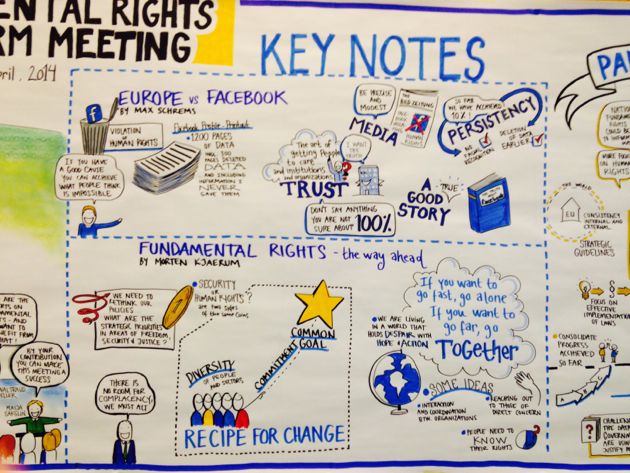Fundamental Rights Platform 2014
On April 10-11 the Fundamental Rights Agency held its 7th Fundamental Rights Platform meeting in Vienna, this year the focus was the future ‘post-Stockholm’ justice and home affairs agenda.
Social Platform co-facilitated a workshop on how to enhance cooperation between Human Rights players; the topic was identified as the most important one by participants. Among the recommendations coming out of the workshop was the need for the Commission to clarify what they mean by real cooperation with civil society (referring to e.g. the Code of Conduct for Partnership), for the FRA to develop a toolkit for effective alliance building so NGOs can know how to best organize themselves according to the requirements of the EU in order to be eligible for funding. Also the need for an internal Human Rights-strategy was mentioned in relation to the challenges of Ministries at national level and DGs at EU level dealing with different aspects of human rights disconnected from each other. FRA also held a workshop asking for inputs for improvement of their governance toolkit on how public officials and local authorities can work with civil society and the Council of Europe presented how civil society contribution in political decision-making processes within the UN system. PICUM also held a workshop on how the EU can better protect migrant children's rights and AGE Platform held one on mainstreaming ageing in the area of freedom, security and justice.

Part of the graphic recording of the FRP 2014
As a keynote speaker Max Schrems presented how he as a student managed to successfully campaign against Facebook (‘europevfacebook’) violations against data protection. His recommendations to the participants was to: 1) be precise and modest (ask for basic compliance with the law), 2) be trustworthy (don’t say anything you are not 100 percent sure about, make sure you have the evidence), 3) have a good story (in this case the little person vs. the big company) and finally 4) be persistent and don’t give up. Schrems persistence led to visibility in the European Parliament, by Commissioner Reding and even Chancellor Merkel. At the moment two cases are in the ECJ and Schrems is in the process of formalizing his work into a permanent NGO.
Morten Kjaerum, Director of FRA spoke about the ways forward and how we need to act together to ensure that legislation is respected, protected and promoted. We can learn from the UN Convention on the Rights of Persons with Disabilities and its consultation with the beneficiaries when shaping laws and rules. Furthermore we need to increase awareness among rights holders in Europe about their rights. Kjaerum also encouraged civil society to tell the Commission that we support FRA to have a continuing strong mandate. He also welcomed NGOs input to how FRA can concretely work on social rights. In the end Kjaerum presented FRA’s plans for 2015 to merge the annual FRP meeting with the Fundamental Rights Conference into one big event in order to bring issues of security, economy and human rights closer together and closer to the decision-makers.
A panel discussed next steps and Salla Saastamoinen from DG Justice admitted that the EU has still much to do to consolidate its achievements and to continue prioritising the rights of children, people with disabilities and minorities and to fight against racism and xenophobia. The Commission welcomes FRA’s opinions, also on criminal and police matters. Saastamoinen clarified that the future justice and home affairs guidelines will not be followed-up with an action plan instead the Commission awaits several strategies that will come to an end in a couple of years in order to assess together with civil society on future steps. Kosmas Boskovits, Chair of the Council’s working party on fundamental rights (FREMP) explained how member states have discussed the guidelines as concise focused priorities for effective implementation of existing frameworks. FREMP is not limited to the scope of the guidelines though and deals with fundamental rights in general including gender, data protection and free movement. They will prepare Council Conclusions on violence against women as well as on the Charter of Fundamental rights and follow-up previous conclusions on hate crime for a conference in Greece. Natacha Kazatchkine from Amnesty International EU Office called for an internal Human Rights strategy that does not repeat the Lisbon treaty but which spells out how the EU and member states should enforce human rights and coordinate its work, policy-making and implementation. Kazatchkine encouraged NGOs to frame our issues in terms of human rights; be persistent and ambitious and don’t get lost in the details, remain patient, manage expectations and appreciate small steps. Understand the processes; identify targets, hooks and momentums. Challenge the lack of transparency and information; the Commission should let us know why, despite our contributions and evidence, our issues are not being included.
Documentation from the meeting is available on FRA’s website and on twitter #FRP2014.
2014-04-13













































